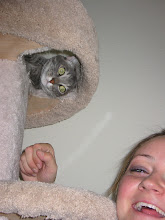Melissa Veum
English 48B
01/07/2011
Journal #2- Charlotte Perkins Gilman
"At night in any kind of light, in twilight, candlelight, lamplight, and worst of all by moonlight, it becomes bars! The outside pattern, I mean, and the woman behind it is as plain as can be (Gilman, 815)".
"Gilman called herself a humanist, and believed the domestic enviornment oppressed women through the patriarchal beliefs upheld by society (Wikipedia, Charlotte Perkins Gilman)".
This quote shows the reader just how upset and alone the narrator of this story felt during her "sickness". This room upstairs that she did not want to be living in anyway, had a horrible yellow stained wall paper on the walls and she just hated it, it creeped her out. In this quote she is talking about how in all forms of light this wall paper becomes bars, bars in so many respects. Bars according to the narrator that keep her locked in this drab colored and decorated room for three months, bars that keep all women from living their lives, and bars that close in on you when there's nothing else to do but sleep and escape reality. The narrator has escaped her own reality because she feels trapped in this house and she talks about how different types of light make the wall-paper bars and how she can see a woman behind them, longing to come out. She says this woman is "as plain as can be" why would anyone who feels trapped look fancy? The narrator sees this woman as maybe a reflection of herself and how plain and monotone she herself has become because of her perscription to do absolutely nothing every day.
The narrator explains that the wall paper looks like bars especially by moonlight maybe because that's when she herself feels the most trapped. Her husband sleeps with her in the same bed almost every night and she does not sleep at night, she is scared to even move in the bed because she will disturb her husband and he will think something is wrong. The narrator is behind these bars herself, she is trapped in a world where everyone in her life thinks she is fine and that she just needs rest and to do nothing, even the things she loves to do. She has to hide her writting and she cannot even move rooms out of one that she simply despises all because her husband, the physician, thinks it is best. No wonder she feels the walls literally closing in on her in the form of bars, especially by moonlight, that is the most awkward, unsafe time of her day. When you are left alone all the time and told to do nothing but rest, your mind takes over, even if it's not supposed to. The narrator, seems to have slipped into her own unconcious and far from reality, but no one notices until the end, and then I don't think her husband knew what to think. She is making a stand for all women through her own personal anguish and escaping reality as a way to get through her days in this room which she hates and feels uncomfortable in. She feels as though I'm sure many woman did during this time when modern medicine was full of theories and unthoughtout ideals of what was best, doctors not knowing that on the inside of theses peoples subconciouses many were screaming from behind their own bars of reality.

No comments:
Post a Comment